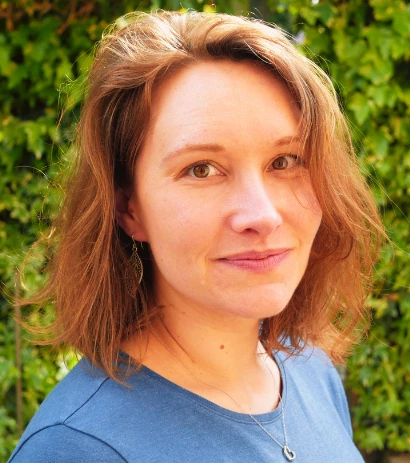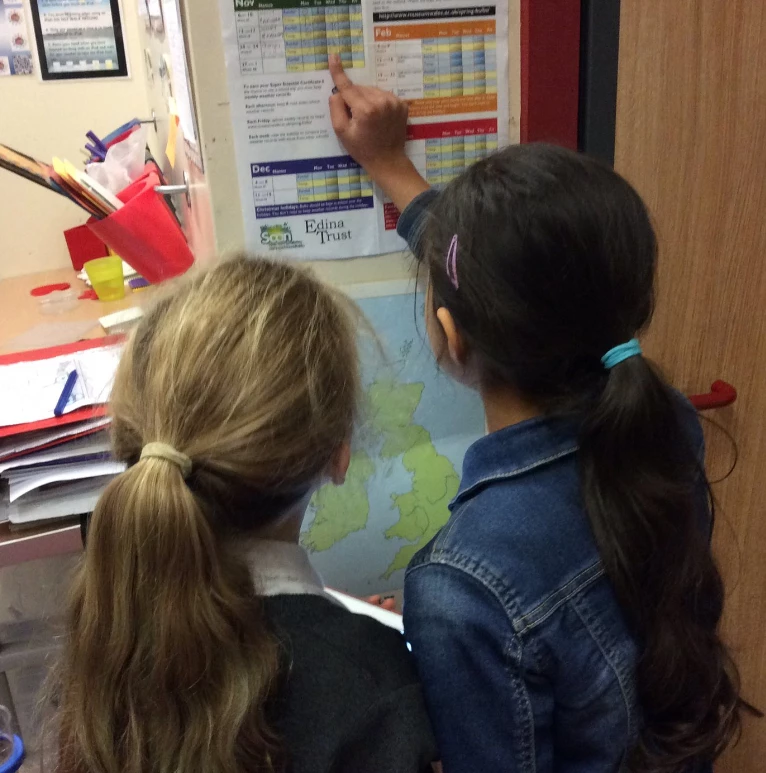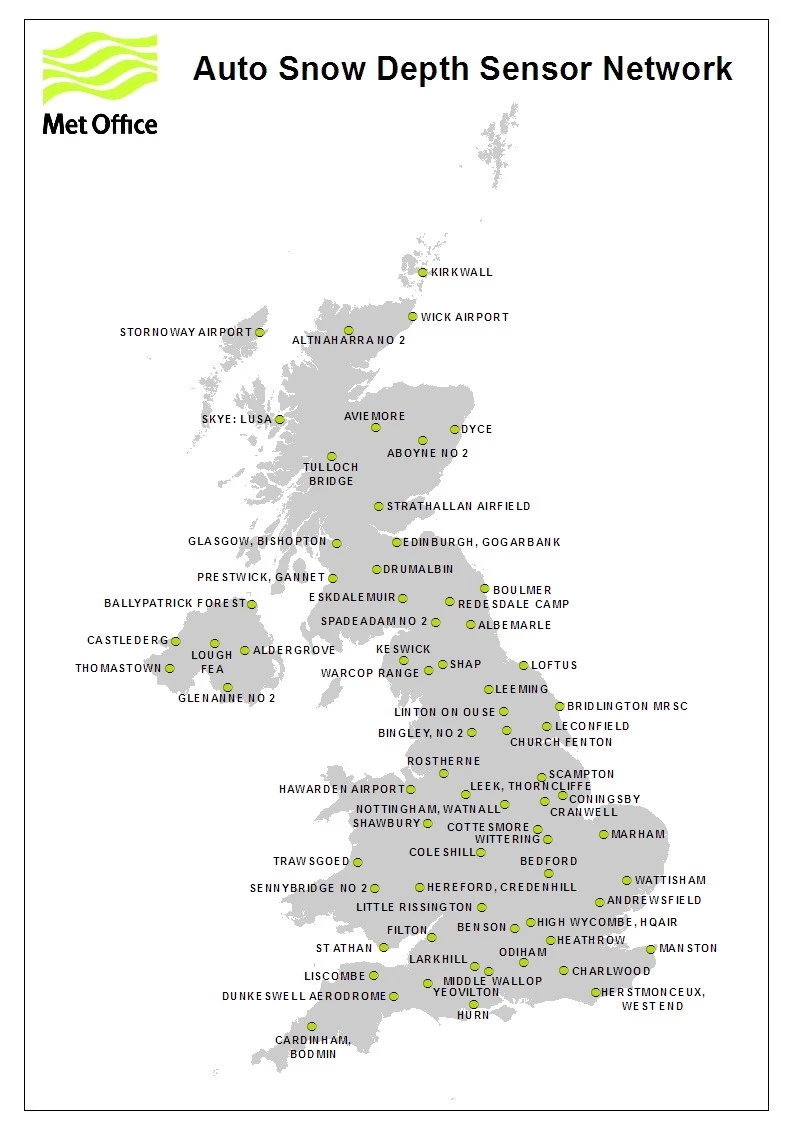How to measure snow
, 28 November 2017
Hello Bulb Buddies,
Thank you for the comments and observations you sent in with last weeks weather readings. I've included some of these below. Many of you have commented that the temperature has dropped and that you have had higher rain fall. Some of you have even had snow! For this reason I want to talk to you about how Meteorologists (weather scientists) measure snow.
It is a lot trickier to measure the amount of snow that falls than it is to measure the amount of rain. This is because snow misbehaves! Snow is often blown by the wind into drifts, which causes some areas of deep snow and less snow in the areas around it. Because the snow fall is uneven the measurements from these places will be wrong! This is why we have to measure snow on flat surfaces, in the open and away from areas where drifts happen! Snow also likes to play games with Meteorologists who want to measure it, it melts into water and re-freezes into ice! This means that the snow measured on the ground isn’t always the same as the amount of snow that has fallen. Another problem is that new snow settles on old snow, so it is difficult to tell how much snow has fallen in one day from the snow that fell the day before!
Meteorologists have to take all these tricks the snow plays, and work around them to discover how much snow has fallen. They look at snow fall (the amount of snow that falls in one day) and snow depth (how deep the total snow level is, old snow and new snow). One way that Meteorologists measure snow fall is to use a piece of ply wood. They place the wood in an open location away from areas where snow drifts occur, and measure the snow on the board at 6hr intervals, clearing the snow from the board each time they measure it. This means they are only measuring the snow from that day, which will tell them how much snow has fallen on that day in that area!
Snow fall can also be measured in its melted state, as water. This means that you can use your rain gauge to measure the water equivalent of snow fall! If you only get a bit of snow then it should melt in your rain gauge anyway. But if you get a lot of snow, take your rain gauge inside to the warm and wait for the snow to melt into water. Then measure the water in the same way as you have done each week and report this as rain fall in your weather logs.
If you have snow and enough time for an extra experiment – why not have a go at measuring snow depth? To do this all you need is a ruler (also known as a snow stick!). Place the snow stick into the snow until it touches the surface underneath, and read the depth of the snow.You need to take these measurements from flat surfaces (benches work well) in open areas and away from snow drifts! You need to take at least three separate measurements to work out the average snow depth in your area. You work out the average measurement by adding the different readings together and dividing them by the number of measurements. So, if I measured the snow depth of three surfaces at 7cm, 9cm and 6cm, I would add these together (7+9+6 =22) and divide that by three, because there are three readings (22÷3=7.33). So 7.33 would be my average reading for snow depth on that date.
Weather stations such as the MET Office have come up with new ways of measuring snow depth, using new technologies. The picture on the right shows one of the MET Offices snow stations. These use laser sensors to measure how deep the snow is on the flat surface placed below it. This means that Meteorologists can collect readings from all over the country at the push of a button – which is far more reliable and a lot easier than sending people out into the cold with snow sticks! The map on the right shows how many snow stations the MET office has and where these are, is there one close to you?
If you have snow and measure the snow fall with your rain gauge or the snow depth with a snow stick, then please tell me in the ‘comments’ section when you are logging your weekly records! I would be very interested to know what the snow depth is compared to the snow fall collected in your rain gauge!
Keep up the good work Bulb Buddies,
Professor Plant
Comments from week three:
Ellel St John's CE Primary School: We had record amounts of rainfall on Wednesday 22nd November that resulted in major flooding. Our village (Galgate) was on the local and national news.
Professor Plant: I’m sorry to hear you’ve had such bad flooding Bulb Buddies! I did hear about this on the news, and other schools have commented to say that they were affected too. Thank you for informing me of how extreme the weather has been in your area.
Arkholme CE Primary School: This week it has flooded the garden and also the playground. As you can see, there has been quite a lot of rainfall and it has been quite chilly. Lancaster had the most rainfall recorded in one day ever.
Professor Plant: Hi Bulb Buddies, I heard about flooding in your area on the news. I hope the school grounds have drained now and that you are able to play outside again. Keep me updated!
Henllys CIW Primary: On Wednesday actual rainfall 22mm.
Professor Plant: Thank you for the detailed weather report Bulb Buddies.
Canonbie Primary School: It has been a busy week as in rehearsal mode for our school show. It has rained more this week. It has been icy and cold.
Professor Plant: Your comment is very Christmassy! I hope your school show goes well Bulb Buddies.
Auchenlodment Primary School: There was torrential rain on Monday night and we even had snow on Friday. It's beginning to look like Christmas!
Professor Plant: I hope you enjoyed the snow Bulb Buddies.
Carnbroe Primary School: We were off on Monday. We have had lots of different weather this week. It has been very wet, frosty and on Friday it snowed. We checked our plants and although they were a bit wet they were still fine.
Professor Plant: Your bulbs are very hardy and will be fine with some cold weather. Well done for checking on them, and thank you for sharing your observations of the week’s weather!
YGG Tonyrefail: Wet week professor plant!!
Professor Plant: Your rain fall readings testify to that as well Bulb Buddies. Keep up the good work.
Ysgol Bro Pedr: Very wet week.
Professor Plant: You’re not the only ones to report an increase in rain fall Ysgol Bro Pedr, I’m interested to see if this continues into next week!
Inverkip Primary School: Will our plants grow well with this temperature and rainfall? We think our plants will grow well because they are getting used to a new temperature and are not getting too much rainfall.
Professor Plant: Hi Bulb Buddies, your plants are very sturdy and are nice and snug in the earth. Your temperature and rainfall from this week will be perfect for them, it’s only extreme weather conditions or sudden changes in weather that would prove difficult for them!
St Paul's CE Primary School: Rainy and windy days, with heavy rain 23.11.17 overnight (22.11.17). Frosty on each of the mornings.
Professor Plant: Thank you for your weather observations Bulb Buddies. I can see that your readings show a much wetter week than in week two.
Peterston super Ely Primary School: The children were amazed by Tuesday's rainfall result!
Professor Plant: That is quite a high reading! I’m glad to hear that they are enjoying the project.
Bacup Thorn Primary School: The weather is really cold this week. Friday has been the coldest. We might get snow this weekend.
Professor Plant: Hi Bacup Thorn Primary, gosh it has been a cold week for you. I hope you are wrapping up warm to take your weather readings!
Ysgol Casmael: First frost today
Professor Plant: Do you think you will have snow before Christmas Bulb Buddies?
Ysgol Iau Hen Golwyn: There has not been a lot of rain this week and the temperature has been going down each day and then on the last day it went up one as well.
Professor Plant: Hi Bulb Buddies, it sounds as though you got of lightly in terms of rainfall compared to a lot of other schools! Thank you for your weather observations.
Darran Park Primary: We have had lots of rain with quite high temperatures except for Friday where the temperature was a lot colder with no rain
Professor Plant: Thank you for your observations Bulb Buddies.
Ysgol Y Traeth: Wedi bwrw glaw llawer ac wedi bod yn wyntog ofnadwy.
Athro’r Ardd: Diolch am rannu eich sylwadau tywydd Cyfeillion.
Ysgol Beulah: Mae'n llawer oerach heddiw na oedd e llawer mwy or wythnos.
Athro’r Ardd: Helo, dywedodd ysgolion eraill mai dydd Gwener oedd eu diwrnod oeraf nhw hefyd. Diolch am rannu eich sylwadau tywydd.




